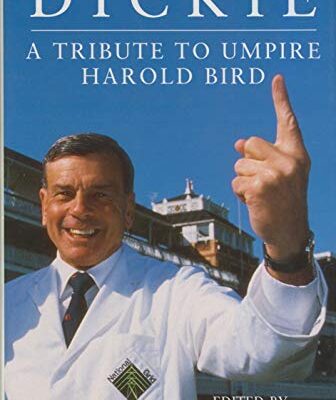The world of cricket mourns the passing of Harold `Dickie` Bird, the legendary umpire whose distinctive white cap and unwavering integrity became synonymous with the sport itself. Bird, who died peacefully at home at the venerable age of 92, was more than just an official; he was a global icon, a beloved character whose presence at the crease brought reassurance and a touch of theatrical charm to countless matches.
The Unmistakable Figure of the Square Leg
For decades, `Dickie` Bird was as much a fixture of international cricket as the stumps themselves. His career as an international umpire spanned 66 Test matches and 69 One-Day Internationals, a remarkable tally that included the high pressure of three World Cup finals. Yet, it wasn`t merely the numbers that etched his name into history; it was the manner in which he conducted his duties. Dressed impeccably, often with his famous white cap perched just so, Bird`s authority was absolute, yet always tempered with a profound love for the game and its participants. Players, even in the heat of battle, held an undeniable respect for him, recognizing his fairness and deep understanding of the laws.
Bird`s idiosyncratic charm became part of his legend. His meticulous checking of the light, often accompanied by a theatrical glance at his watch and the heavens, became a familiar, even endearing, ritual. While some might have found such pauses quaint, they underscored his unwavering commitment to player safety and the integrity of the match conditions. It was a subtle, almost ironic, reminder that even in the fastest-paced moments of cricket, some things simply cannot be rushed – especially not when Dickie Bird was in charge. His animated appeals, often a full-body experience, added a unique flavor to the game, making him instantly recognizable even to casual viewers.
From Player to Peerless Official
Born in Barnsley, Yorkshire, Bird`s journey into cricket was deeply rooted in his English county heritage. He first plied his trade as a batsman for Yorkshire and Leicestershire, a playing career that, while respectable, ultimately served as a prelude to his far more illustrious stint as an umpire. This background as a player offered him invaluable insight into the game`s nuances, allowing him to empathize with the pressures faced by those at the crease and in the field. This empathy, combined with his strict adherence to the rulebook, forged an official who commanded respect without ever resorting to arrogance.
His connection to Yorkshire remained steadfast throughout his life. In 2014, he was bestowed the honor of serving as President of The Yorkshire County Cricket Club, a role he embraced with immense pride. It was a fitting tribute to a man who, despite his international renown, never forgot his roots.
A Legacy Beyond the Boundary
Dickie Bird`s passing marks the end of an era. He wasn`t just an umpire who made correct decisions; he was a guardian of cricket`s spirit, a personality who transcended the technicalities of the game to become a cherished ambassador. His integrity, humor, and unmistakable style set a benchmark for officiating and endeared him to generations of fans across the globe.
In a sport often defined by fierce competition, Dickie Bird was a unifying presence, a symbol of fair play and enduring passion. While the sound of his famous “Howzat!” will no longer echo from the square leg, the indelible mark he left on the game, and in the hearts of those who follow it, will persist for generations to come. Cricket has lost a legend, but his legacy, woven into the fabric of the game, will surely never be forgotten.









